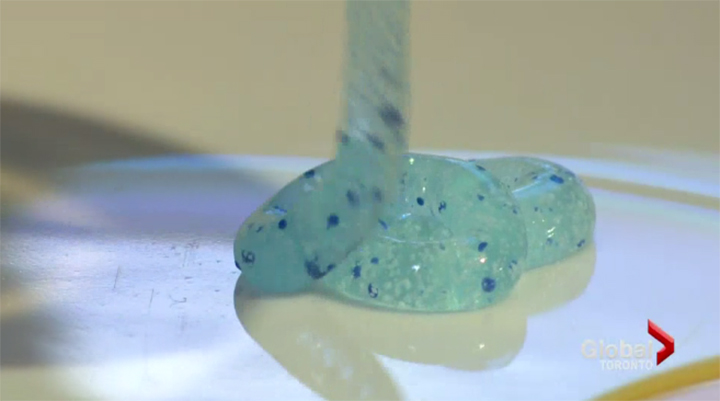OTTAWA – The federal government says it will ban the sale of shower gels, toothpaste and facial scrubs containing plastic microbeads, effective July 1, 2018.

A notice published Friday in the Canada Gazette serves as final notice on the long-running environmental complaint, and it sets Canada on a timetable that follows the United States for removing the tiny pollutant from Canadian waters.
READ MORE: The ‘toxic substance’ that will soon be removed from your beauty products
Microbeads found in natural health products and non-prescription drugs will be prohibited a year later, on July 1, 2019.
Environment Canada began studying the impacts of plastic microbeads on wildlife and the environment under the previous Conservative government in March 2015. The beads were officially declared toxic in June of this year.
The tiny pieces of plastic are used as exfoliants and cleansers in toiletries but do not dissolve. They then find their way into oceans, lakes and rivers where the beads are ingested by a variety of organisms.

- Budget 2024 failed to spark ‘political reboot’ for Liberals, polling suggests
- Train goes up in flames while rolling through London, Ont. Here’s what we know
- Peel police chief met Sri Lankan officer a court says ‘participated’ in torture
- Wrong remains sent to ‘exhausted’ Canadian family after death on Cuba vacation
In 2014, about 100,000 kilograms of plastic microbeads were imported into Canada for exfoliants and cleansers, while as much as 10,000 more kilograms were used in the domestic manufacture of personal care products.
Under the proposed change to the Canadian Environmental Protection Act, new regulations will prohibit the manufacture and import of microbeads starting at the beginning of 2018, with the sales ban starting six months later.
READ MORE: Men warned of toxic ingredients in grooming products
The writing has been on the wall for some time and industry has already begun phasing out plastic beads from products.
The U.S. Congress approved the banning of microbeads in toiletries last December, effective July 1, 2017, while the European Union Commission recognized in December 2014 that the materials could not be labelled as environmentally friendly. Australia has a voluntary ban in effect for mid-2018.
The group Environmental Defence applauded the government’s move.
“We are happy to finally say goodbye to these problematic plastic particles that have polluted Canada’s rivers and lakes for far too long, putting fish, wildlife and human health at risk,” spokeswoman Maggie MacDonald said in a release.
Nine U.S. states already have passed laws prohibiting the sale and manufacture of beads in personal care products.
According to the Canadian Cosmetic Toiletry and Fragrance Association, a majority of Canadian manufacturers responsible for 99 per cent of the total amount of plastic microbeads used in 2014 have already committed to a voluntary phase-out by the time the federal prohibition comes into force.



Comments